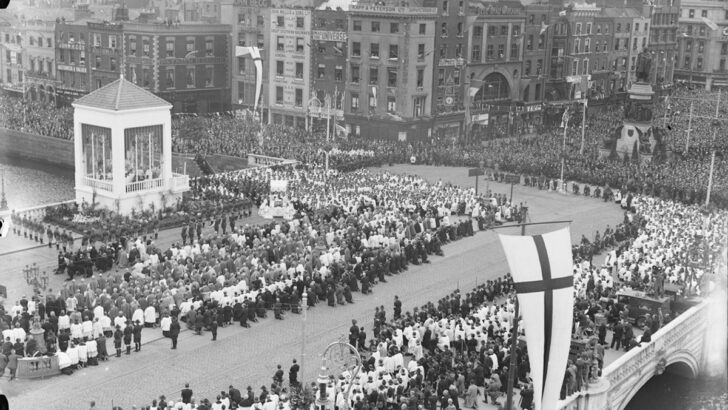When I was a young feminist, engaging in fiery discussions with the likes of June Levine, Nell McCafferty, Mary Robinson and Mairín de Burca, there was one principle on which we agreed: this was “the personal is political”. And furthermore, we affirmed that “everything is political”. We young leftists absolutely concurred that politics was part of every sphere of life.
And now an old friend from those days, TP. O’Mahony, has written a new book – at the age of 84 – called The Politics of God, which stresses the damage and corruption that ensues when religion and politics are entwined. (The foreword is by Mary McAleese, who thunders away eloquently about “the misogyny and homophobia” that has for so long characterised the “conservative values claiming divine legitimacy”.)
Entwinement
With the entwinement of religion and politics, bad and evil regimes have emerged, TP. points out, giving as his examples the oppressive state of Afghanistan under the Taliban, the militarism of Japan under Imperial Shintoism, the sectarianism of the Northern Ireland regime, and the “theocracy” of the Irish Free State.
Quoting the Russian-Greek Marxist film-maker Costas-Gavras, and the atheist Polly Toynbee – she’s a campaigner for secularism and deleting all religion from the public sphere – as well as many other distinguished liberal authors and intellectuals, TP. adduces that political religion is always a bad thing, and almost always perverts power.
Actually, I now agree that politics and religion should be separate. And so, surely, did Jesus Christ, saying: “Render therefore unto Caesar the things that are Caesar’s and unto God the things that are God’s.”
Yet a problem arises in analysing that idea we discussed as young feminists: that everything in this world is political, and that even personal judgements can be a political act. In which case, politics will inevitably creep into every sphere of worldly endeavour.
Moreover, if a certain state – say the Irish Free State from 1922 – is composed in the majority of Roman Catholics, then it follows that the values of the society, and therefore the political structure, will reflect that value system. Ditto for Shinto Japan, Lutheran Finland or Orthodox Greece – these societies have historically mirrored the religion of their people.
Sometimes, in the discourses of hi-falutin intellectuals, the people are forgotten or overlooked. Ireland wasn’t Catholic because John A. Costello was devout: it was because the people adhered to their faith.
Division
The division between Caesar and God should indeed be upheld as an ideal. TP. has written a challenging thesis underlining the dangers, sometimes evils, of politicising religion. Yet the paradox is that in a true democracy the people’s values are reflected in the structures of power, and that’s the conundrum of keeping faith and politics perfectly separate.
‘The world has gone mad’
Never thought I’d see the day when someone would be campaigning to ban the Bible in the United States. But following Utah’s prohibitions on indecent publications, a parent is seeking to have the Scriptures banned on grounds that it’s racist and a “dog-whistle” message for Neo-Nazis. Since the Old Testament (the Hebrew Bible) is the history of the Jewish people, that’s mad.
I do remember my mother lamenting “the world has gone mad”, and now I hear my contemporaries – and younger people too – uttering those words. Our lovely peat turf is seen as toxic; a traveller can’t buy a cup of tea on a train using cash; animal lovers attack the race-track claiming that horse-racing is “cruel” to the very equines bred to run fast. And we are assured that men can be pregnant while certain politicians are reluctant to define what a woman is.
France is marking “Mother’s Day” this month, but there’s a campaign to cancel the “Fête des Meres”, and replace it with “The Day for People One Loves” (“Fête des Gens Qu’on Aime”). Because, apparently, “mother” is a discriminatory noun, and it could offend those who are not, or do not have, a mother. Mad!
* * *
I wonder what James Joyce would have made of the announcement that the Irish State plans to kill 150,000-200,000 head of cattle over the next three years to meet climate change requirements? With his adherence to symbol and metaphor, he might see it as an attack on the emblem of Ireland itself, which he calls “the silk of the kine” in Ulysses.
Ireland was portrayed as a cow by the Limerick-born poet (and Catholic convert) Aubery de Vere in his patriotic verse: “The silk of the kine shall rest at last/ What drove her forth but the dragon-fly/ In the golden vale she shall feed full fast/ With her mild gold horn and her slow dark eye.”
Cattle represent wealth and status in ancient Ireland, as the 7th-8th Century epic the ‘Taín Bó Cúailnge’ – the ‘Cattle Raid of Cooley’ – demonstrates. To slay these sweet creatures in such numbers certainly seems an onslaught on our heritage.


 Mary Kenny
Mary Kenny The huge crowds that attended the 1932 Eucharistic Congress seen here on O’Connell Bridge. The Catholic values of the Irish Free State reflected those of the Irish people. Photo: National Library of Ireland.
The huge crowds that attended the 1932 Eucharistic Congress seen here on O’Connell Bridge. The Catholic values of the Irish Free State reflected those of the Irish people. Photo: National Library of Ireland.